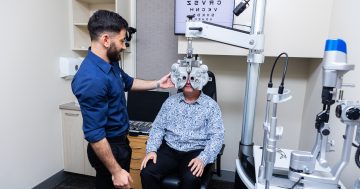
The University will host three of the 28 microcredential courses under the pilot program. Photo: UC.
The University of Canberra (UC) will be accommodating about 140 places in three ‘microcredential’ courses it will be offering in 2024 as part of a new pilot program to teach targeted skills.
In June, federal Education Minister Jason Clare announced the microcredentials program after calling for applications last November, and UC was awarded three out of the 28 short course grants.
The applications called for microcredential courses that meet specific criteria and must be sourced from a higher education award as defined in the Tertiary Education Quality Standards Agency Act 2011.
UC had already developed working relationships with three partnership groups in the region – the Catholic Education System in Canberra/Goulburn archdiocese, the ACT Education Directorate, and public schools in the capital region just over the border in NSW.
“The opportunity to work with microcredentials is something that UC has been looking at for some time,” UC Clinical Associate Professor Matthew Brown told Region.
Microcredentials are defined as small courses in specific areas of study designed to upskill or reskill workers in a short timeframe. The government says microcredentials offer students more flexibility to mix and match studies across the higher education sector to enable them to find a new job or get ahead in their current field.
“The difference with microcredentials is that we’re saying, ‘Alright, what does your system need and identify as requirements for your teaching staff or your middle school leaders to be able to advance the system needs’, rather than us just saying, ‘This is what we’re offering, why don’t you take it up’,” Professor Brown added.
“It’s a more bespoke model of delivery and of learning, and we’re co-designing the units of study so that they meet the system and the school’s needs, and the teacher’s needs within those systems,” he added. “That’s a significant shift in thinking about how to deliver quality, meaningful higher education opportunities for postgraduate work.”
The pilot program is part of the government’s wider efforts to grow interest in microcredentials, including the MicroCred Seeker platform launched last December. MicroCred features 425 microcredential courses from 56 registered providers, including more than 80 technology, engineering and IT courses.
The initial funding of $18.5 million will support the development of courses across IT, engineering, science, health and education in conjunction with the universities. It should be sufficient to deliver the courses for up to 4000 students by 2026.
For UC to win three of the 28 pilot grants from a pool of more than 90 applications is a testament to the work it had already done in building these partnerships.
“I must admit, I’m delighted,” Professor Brown said. “The point here is, we provided the Commonwealth Department of Education with evidence of an already existing partnership, and a richness of opportunities for teachers and systems to take this further.
“The Commonwealth Government doesn’t normally fund parts of a course like graduate certificates or a masters,” he added. “What this opportunity is doing is ensuring it’s affordable for teachers to participate in. In fact, it’s the most cost-effective way to allow more teachers to embrace postgraduate opportunities.
“For the next few months we will work with the three different systems to co-design what those units will look like and what the content will be – it will be different for each of them obviously because we are producing the outcomes in partnership with the systems and schools.”
Professor Brown said there was no ideal candidate for the microcredential, and that each of the three microcredentials will have about 45-50 students.
“I’d suggest we don’t really have a predetermined idea who they are,” he said. “They may have been teaching for a few years and already know they want to become a school leader, or they may be becoming an expert in evidentiary learning and teaching or want to enhance their skills to become an instructional leader.”
He explained that, while a normal master’s degree or part-time graduate of education requires about 300 hours of study per semester and thus, places a huge demand on a teacher if they’re still working, the microcredential will be about half that amount of work and be spread over a 12-month or a slightly longer period. He said this allows teachers to better manage their learning as part of their role instead of in addition to their role.
“If this works for us, we know there’s an opportunity to extend and expand the opportunities for those three systems to continue to build teacher capacity and knowledge in these areas,” he said. “Once we’ve got this credential established, it’s there for us and other higher education providers to use.”





















